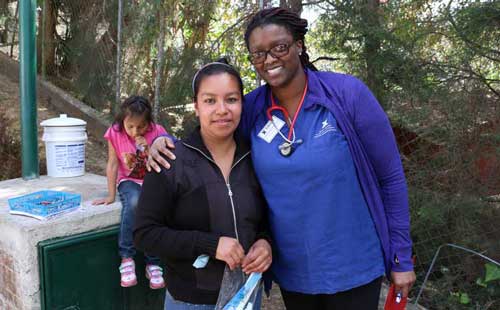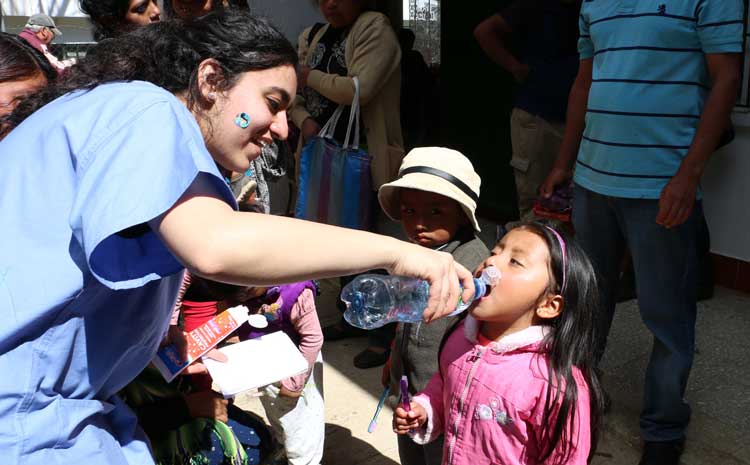
Medical Service Trip: Changing Lives in Guatemala for Nine Years
Nov 9, 2018
By Molly Duffey, '21
On her last day in Guatemala, pre-med student Zenab Saeed was assigned to work in the part of the clinic where they dispensed glasses. Since the glasses were all donated, everyone tried them on and made piles based on what they felt was the strength of the prescription.
When an old man came in, he reminded Zenab of her grandfather, except for the fact that he was almost completely blind, unable to see since birth.
"We had him try on each set of glasses until his vision was near perfect," she says. "There's no words for that experience. I am tearing up just thinking about it. It's amazing that we have that type of impact on someone, being able to change their lives in such a short time."
Being able to change lives is exactly what Zenab and the 11 other Xavier University students came to do in the village of Choacorral just west of Guatemala City during a seven-day trip last March as participants in the annual Guatemala Medical Service Trip.
Stephanie Ibemere ('10, '15), who earned her bachelor's and MSN from Xavier and now serves as a Clinical Research Nurse for American Nursing Care, went on the trip when she was a student at Xavier and now goes as one of the team's triage nurses. She says the trips are teaching the next generation of doctors and nurses, and the trip she took as a student inspired her.

"I was inspired myself to go on with schooling," she says. "I'm working on my PhD right now in nursing research."
Changing lives-of not only the villagers, but the students as well-is what the annual trip to Guatemala is all about. The service trip was created nine years ago by Rabbi Abie Ingber, founder and director of the Center for Interfaith Community Engagement. Its original focus was to treat illnesses that were prevalent in the villages, such as pediatric deaths due to diarrhea. But the goal has since shifted to helping villages become more self-sufficient, so they can provide their own health care.
When villages rely on short-term visits from groups like Xavier's for their basic health care, the question becomes what they do for the rest of the year, Ingber says.
"If our flight leaves Sunday morning at 9:00 a.m. and you get sick in Guatemala Sunday morning at 11:00 a.m., then the fact that we were just there for a week is irrelevant," Ingber says. "We really try to build over the course of time the capacity of a community to heal itself, to take care of itself and to be able to respond to its own needs without our presence. It's like we are there even when we aren't."
Each year, Ingber and his medical team, including a pediatrician, an internist, a pharmacist and two triage nurses, bring 12 students who are either majoring in nursing, occupational therapy or pre-med to Guatemala to provide health care in villages that have little to no medical facilities of their own. Students must apply and be selected to be a part of the trip.
The students work to raise money for the trip each year through special events such as the Nearly Naked Mile race, Currito fundraising opportunities, and collecting donations during basketball games in the Cintas Center.
The first service trip in 2006 began in Patanatic, a remote village in the mountains west of Guatemala City that was suffering from a high rate of pediatric deaths from diarrhea caused by contaminated water from a spring that had always been the village's main water source. The team decided to treat the condition long-term by providing simple carbon filtration buckets for clean water in each home.

Six years later, every home, hut and shack in the mountain village had a charcoal filter for their water. Well before the last Xavier group visited Patanatic in 2016, there were no more pediatric deaths due to diarrhea.
Now the village is doing even more to improve their health. The Xavier team trained two villagers as health care assistants to keep villagers' charts up to date and supervise medical follow-up visits, and the community helped a young man named David go to college and now medical school. The plan is for David to come back to the village to be its own doctor in a clinic that they have already built with their own hands.
"We are prepared to go back for six to 10 years," Ingber says. "It may cost us half a million bucks to do that, but we are committed to it. Each year different students will grow from that experience. Our medical team stays the same. But as the students grow, the community's capacity to take care of itself grows."
Feature Image: Xye Inzauro, who graduated in 2017 with a nursing degree, checks a child's heart rate at the clinic in Choacorral.